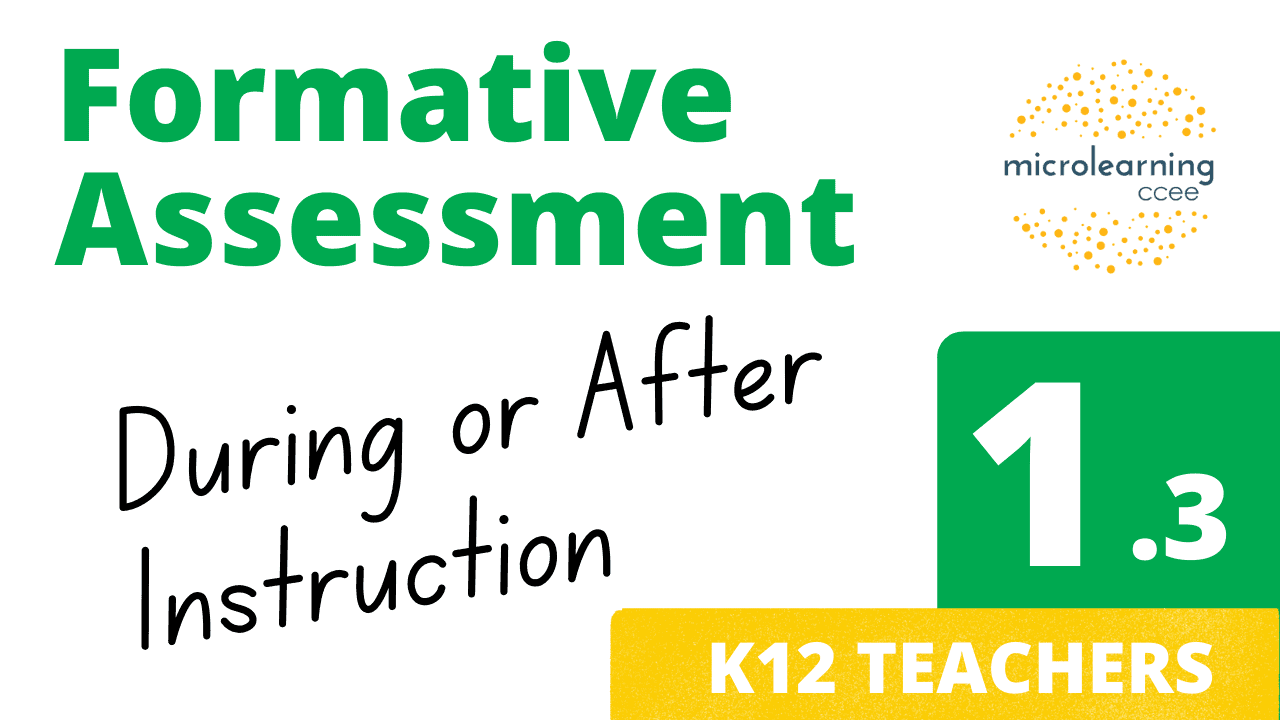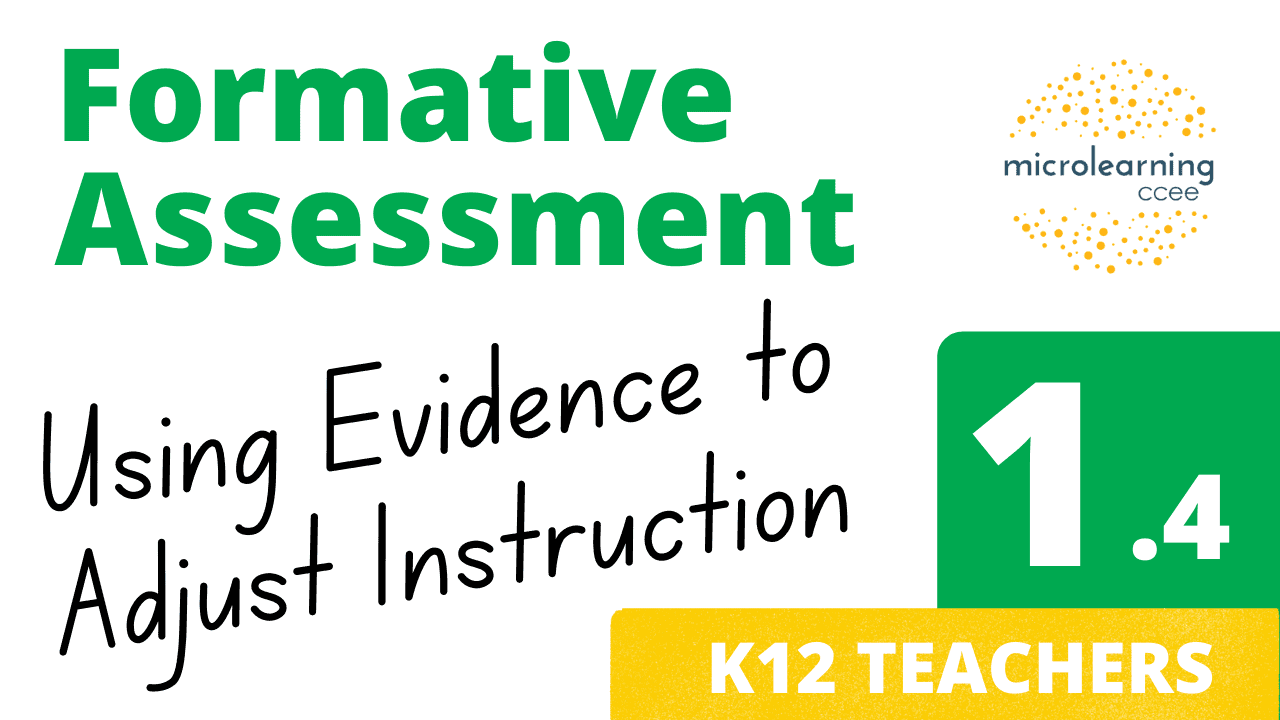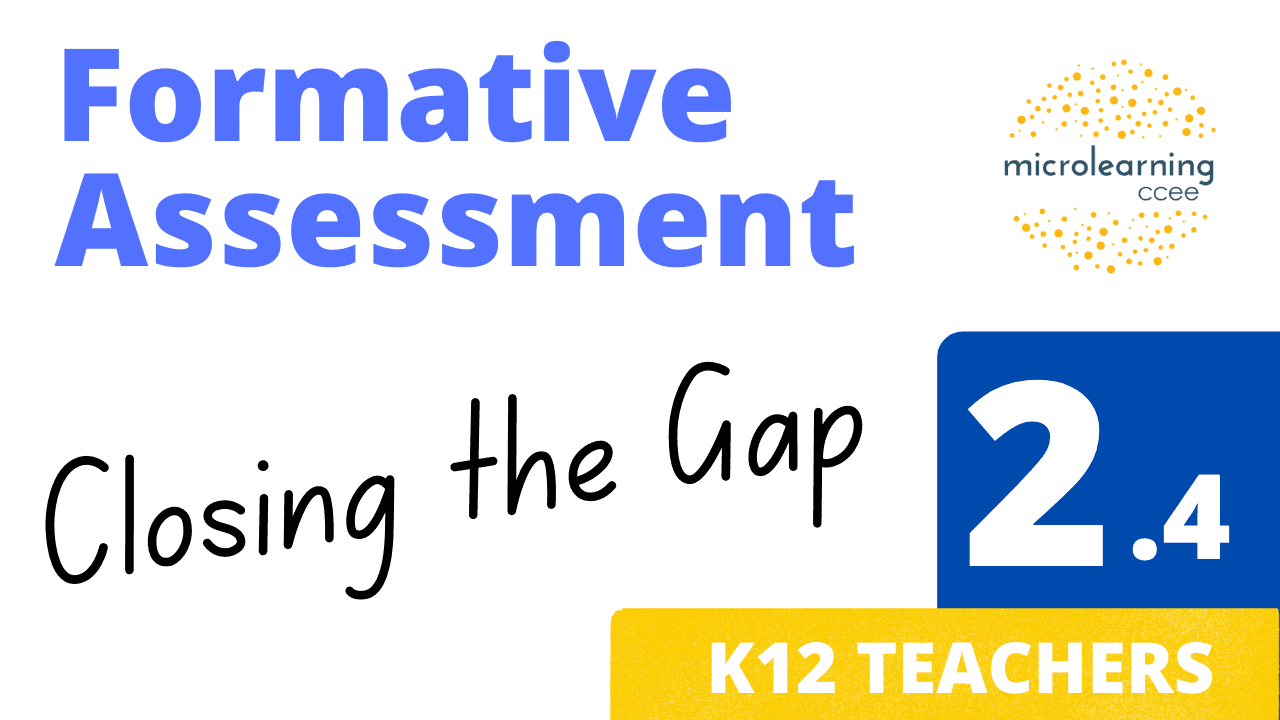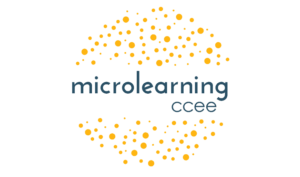Formative Assessment
In collaboration with the Center for Assessment, we offer you three micro-courses focused on learning acceleration using formative assessment processes in the classroom.
Each of these micro-courses is divided into different parts containing pre-recorded video presentations that are between 15-25 minutes long, as well as hyperlinks within the presentation handouts to additional resources and materials.


Formative Assessment in the Classroom: Introduction (For Teachers)
Micro-Course 1 is specifically designed for K-12 classroom educators, particularly those new to the profession or who have less background knowledge and experiences in assessment purposes and uses.
This micro-course includes four modules. The first module begins with an overview of the formative assessment process and serves as an introduction to key concepts for novice educators. Module 2 and 3 both address identifying where the learner is now using quick formative pre-assessments (Module 2) and formative assessment strategies during or after instruction (Module 3). Module 4 focuses on how teachers can close the gap between where students are now and where they need to go by adjusting instruction to better meet students’ needs. Each of the four modules has a pre-recorded video presentation that is between 15-25 minutes long, as well as hyperlinks within the presentation handouts to additional resources and materials.

Formative Assessment 101 – Introduction
This video will provide you with the information you will need to understand the intended audience, guiding questions, organization, and proposed uses of the four modules in Micro-Course 1 as well as how Micro-Course 1 relates to the modules in Micro-Course 2. Both micro-courses focus on learning acceleration using formative assessment processes in the classroom.

Formative Assessment 101 – Part 1: Formative Assessment Processes and Learning Acceleration
In order to gather information that is useful for making better educational decisions, evidence of student understanding or learning must be collected. Watch this video for a primer on assessments and learning acceleration.

Formative Assessment 101 – Part 2: Using Quick Pre-assessments
Pre-assessments can improve learning by telling the teacher where to begin instruction. Watch this 10-minute video for more on pre-assessments.

Formative Assessment 101 – Part 3: Using Formative Assessments During or After Instruction
This learning module focuses on providing you with strategies to identify where the learner is now both during and after instruction in relation to grade level expectations and unit learning goals.

Formative Assessment 101 – Part 4: Using Evidence of Learning to Adjust Instruction
Key to the conversation in this module is the concept that formative assessment is a process that is inseparable from instruction. Formative assessment processes are the bridge between teaching and learning.
Formative Assessment in the Classroom: Advanced (For Teachers)
Micro-Course 2 is specifically designed for experienced K-12 classroom educators or for those who have completed Micro-Course 1 and want additional training or to go deeper into concepts related to formative assessment processes.
The micro-course includes four modules. The first module begins with an overview of the formative assessment process and serves as an advanced introduction to key concepts for educators. Module 2 addresses how to clarify, share, and help students to understand the learning intentions and success criteria for a unit and lesson. Module 3 focuses on how to provide feedback that moves student learning forward. Module 4 provides suggestions for how to involve students and their peers in the formative assessment process. Each of the four modules has a pre-recorded video presentation that is between 15-25 minutes long, as well as hyperlinks within the presentation handouts to additional resources and materials.

Formative Assessment 201 – Introduction (Advanced)
Welcome to the Introduction to Micro-Course 2. This module will provide you with the information you will need to understand the intended audience, guiding questions, organization, and proposed uses of the four modules in Micro-Course 2 as well as how Micro-Course 2 relates to the modules in Micro-Course 1. Both micro-courses focus on learning acceleration using formative assessment processes in the classroom and were created by the California Collaborative for Educational Excellence and the Center for Assessment.

Formative Assessment 201 – Part 1: Learning Acceleration (Advanced)
The first module of this micro-course begins with an overview of the formative assessment process and serves as an advanced introduction to key concepts for educators.

Formative Assessment 201 – Part 2: Where the Learner is Going
This module focuses on the first aspect of Dylan Wiliam’s framework related to embedded formative assessment strategies: where the learner is going. We discuss the role of the teacher, peer, and learner in the process of clarifying, sharing, and understanding learning intentions and success criteria. Subsequent modules focus on the other part of the framework.

Formative Assessment 201 – Part 3: How to Get There
This module focuses on the third aspect of Dylan Wiliam’s framework related to embedded formative assessment strategies: how to get there. This module discusses the role of the teacher in identifying students’ strengths and needs to monitor and adapt instruction in support of providing formative feedback to move learning forward. Modules 1, 2, and 4 focus on the other parts of the framework.

Formative Assessment 201 – Part 4: Closing the Gap
This module focuses on the last two aspects of Dylan Wiliam’s framework related to embedded formative assessment strategies: the role of the learner in activating their own learning and peers as learning resources. Modules 1-3 focus on the other parts of the framework.
Supporting Teachers Focused on Learning Acceleration (For School Leaders)
Micro-Course 3 is specifically designed for K-12 school leaders and instructional coaches and focuses on providing school leaders with strategies to support teachers focused on learning acceleration using formative assessment processes in the classroom.
The micro-course includes four modules. The first module begins with an overview of the formative assessment process and serves as an advanced introduction to supporting high-quality formative assessment processes in the classrooms. Module 2 addresses how school leaders can support teachers in understanding and using formative assessment processes. Module 3 focuses on how to support teachers’ selection or creation of formative assessments. Module 4 provides suggestions for supporting teachers in engaging students and their peers in the formative assessment process. Each of the four modules has a pre-recorded video presentation that is between 15-25 minutes long, as well as hyperlinks within the presentation handouts to additional resources and materials.

Formative Assessment 301 – Introduction
Welcome to the Introduction to Micro-Course 3. This module will provide you with the information you will need to understand the intended audience, guiding questions, organization, and proposed uses of the four modules in Micro-Course 3 as well as how Micro-Course 3 relates to the modules in Micro-Course 1 and 2. This micro-course focuses on providing school leaders with strategies to support teachers focused on learning acceleration using formative assessment processes in the classroom. These micro-courses were created by the California Collaborative for Educational Excellence and the Center for Assessment.

Formative Assessment 301 – Part 1: Supporting Formative Assessment in the Classroom
This first module begins with an overview of the formative assessment process and serves as an advanced introduction to supporting high-quality formative assessment processes in the classrooms.

Formative Assessment 301 – Part 2: High Quality Discussion with Teachers
In this module, we are going to discuss three tools and resources that can be used to move teacher practice forward with respect to formative assessment processes: 1) Student Work Analysis Protocol; 2) Formative Assessment Discussion Tool for School Leaders; and 3) Professional learning about the art of conferring with students.

Formative Assessment 301 – Part 3: Suporting Teachers with Formative Assessment During or After Instruction
In this module, school leaders will consider how to examine lesson learning intentions and how effective discussions, tasks, and activities can be engineered to elicit evidence of student learning. The goal is to help school leaders support the implementation and change process around these practices in their schools and districts.

Formative Assessment 301 – Part 4: Supporting Teachers As They Involve Students and Their Peers
In order to gather information that is useful for making better educational decisions, evidence of student understanding or learning must be collected. Watch this video for a primer on assessments and learning acceleration.
